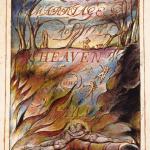
Today is known as “Divine Mercy Sunday” in the Roman Catholic calendar and is associated with Faustina Kowalska (later known as St. Faustina). She was a Polish girl of limited education and humble means. She lived and died during the Great Depression (1938) and marveled at God’s mercy for all people, especially those who are spiritually destitute. Now depending on how you look at life, Friday and Saturday leading up to today also displayed divine mercies. The awareness of divine mercies amid all life’s challenges can help us in facing various forms of destitution and depression.
Case in point. My adult son Christopher’s CNA (certified nursing assistant) shared with me on Friday how Christopher was visibly upset when she went to reposition him. He had been facing the window for a while, and she planned to reposition him to face the door. The CNAs have to reposition my son every two hours or so in the effort to guard against the development of pressure wounds. So, she creatively adapted her strategy on how to reposition Christopher so that he could still look out the window.
There is a bird feeder in front of my son’s window and birds often hover and perch there. Some squirrels were also making window visits. Christopher’s look of consternation vanished when the CNA granted his wish and adapted her strategy. He smiled when she faced him toward the window again. He then closed his eyes. His CNA said that Christopher probably experienced comfort in seeing the birds at the feeder and wanted to keep gazing outside. Later, when she checked up on him, he was looking out the window and smiling again. Divine mercies.
Christopher and I both experienced divine mercies on Friday. When the CNA, or better, the certified nursing archangel (she is one of the best CNAs I have met), reported these events to me, I also experienced comfort. Her words about the birds feeding by Christopher’s window called to mind Jesus’ words recorded in Matthew 6: “Look at the birds of the air; they do not sow or reap or store away in barns, and yet your heavenly Father feeds them. Are you not much more valuable than they? Can any one of you by worrying add a single hour to your life?” (Matthew 6:26-27; NIV)
Speaking of growing, harvesting, and storing food, Christopher cannot sow or reap or store away in barns since his traumatic brain injury over two years ago. He is completely dependent on others’ care. This is so incredibly painful to me in that my son was an exceptionally hard worker, just like his grandfather. I used to tell him how much he reminds me of his Grandpa Metzger. And yet, even while painful, I still see divine mercies on display in my son’s life.
How so? Modern science has made it possible for someone like Christopher to be fed through a feeding machine and feeding tube. I would hate to think of the alternative. One article titled “The History of Surgically Placed Feeding Tubes” published in 2006 in Nutrition in Clinical Practice stated that, “Although supplemental enteral nutrition may have first been delivered by enema, the modern era of surgically placed feeding tubes began in the mid to late 1800s. Early procedures were generally disastrous, however, techniques rapidly improved. The basic techniques of surgical enteral access have not changed significantly in the last century, although endoscopic, radiologic and laparoscopic modifications have been described and adopted in the last 25 years.”
A student in my ethics class this semester had indicated in a discussion on medical care for people in extreme conditions he would rather die than be hooked up to a feeding tube. He remarked to laughter that he would not want “liquid spaghetti” to be pumped into him. Another student, who no doubt knew someone in critical care, immediately responded that most of us think we would rather die than experience such hypothetical scenarios until they are no longer hypothetical, but actual.
I am thankful Christopher has a feeding tube, and also a trach, for breathing purposes. The feeding tube and the trach are better than the alternatives. Here’s what an article titled “Tracheotomy History” published in News Medical has to say about the procedure: “From the 16th century to the 19th century, a tracheotomy was generally regarded by surgeons as dangerous with a low chance of success, and, as a result, few surgeons were willing to perform the procedure. Tracheotomies were reserved as an option for emergency treatment for obstruction of the upper airways, although the success rate of the procedure was not favorable.” The twentieth century saw a vast increase in use and dramatic decrease in mortality based on better techniques, materials, and post-operative care. Again, divine mercies.
Some might puzzle over why I associate medical care with divine mercies. It’s because I think God works in extraordinary ways through ordinary though exceptionally skillful processes and procedures. Some might also puzzle over how I can see God at work through such tragic circumstances involving my son’s minimally conscious and exceptionally dependent state. When I think of the alternatives and realize that without this CNA and without a feeding tube and trach, my son would be dead. Such realizations change one’s outlook on life.
Like the little birds, Christopher is dependent on God’s care in so many basic level ways. The same is true for each of us. We must take time to ponder divine mercies. But such consideration will require hitting the pause button on the mental machine that feeds our illusory sense of total self-sufficiency and that fuels our futile quest for immortality. We are all on feeding and breathing tubes, dependent on divine mercies for daily existence, if we will pause to think.
Before closing this account on Divine Mercies Sunday, I wish to consider the divine mercies I observed Saturday. Two CNAs and a respiratory therapist (RT) were preparing Christopher to be placed in his wheelchair late yesterday morning. It was quite the procedure as the RT suctioned him and the CNAs moved him from his bed with the Hoyer lift to his wheelchair. It is easy to take such lifts and caregivers for granted. But I didn’t, at least not yesterday, as I watched them care for my son.
My family cannot do it alone. We need their help. It brought tears to my eyes as I watched them tend to my child with such thoughtfulness and tenderness. When I thanked them, one of the CNAs was taken aback. He said those words of appreciation made his day, as if to suggest that they are often taken for granted. In all honesty, he and his colleagues made my day. One should never take divine mercies for granted, although I do it almost all the time.
I shouldn’t take Christopher’s Hoyer lift for granted. Its architect sure didn’t. Ted Hoyer was involved in a car accident at the age of sixteen. He was paralyzed from the neck down. But he was “an innovative quadriplegic,” who did not allow his condition to keep him down. He created the very first powered patient lift with the assistance of his cousin, Victor Hildemann, to increase his level of independence and mobility.
Now granted, Christopher is not able to be innovative to this degree. He relies on others’ use of Ted Hoyer’s innovation to get out of bed and into his wheelchair. But even Christopher, in his extremely limited condition, manifests signs of innovation on occasion. After all, he did get his attentive CNA to turn him back toward the window through the innovative change of facial expressions!
If I look closely at Christopher and his surroundings, I see evidence of medical miracles and ordinary signs of extraordinary instances of divine mercies. If I stop to consider all the people who have cared sacrificially for Christopher, his wife, and daughter, and who read my posts, pray for us, and encourage us, I witness near countless instances of divine mercies. I just need eyes to see.














